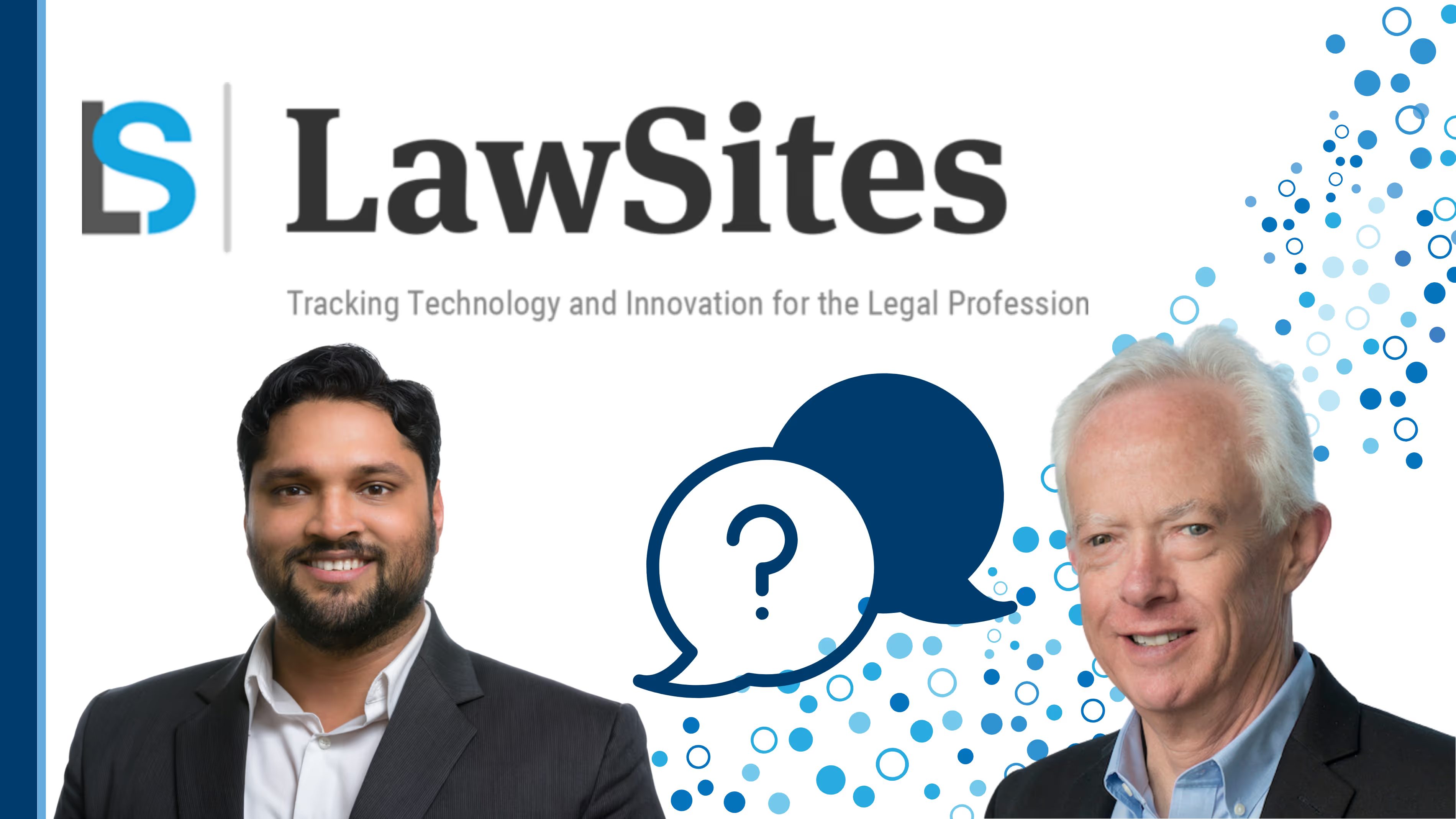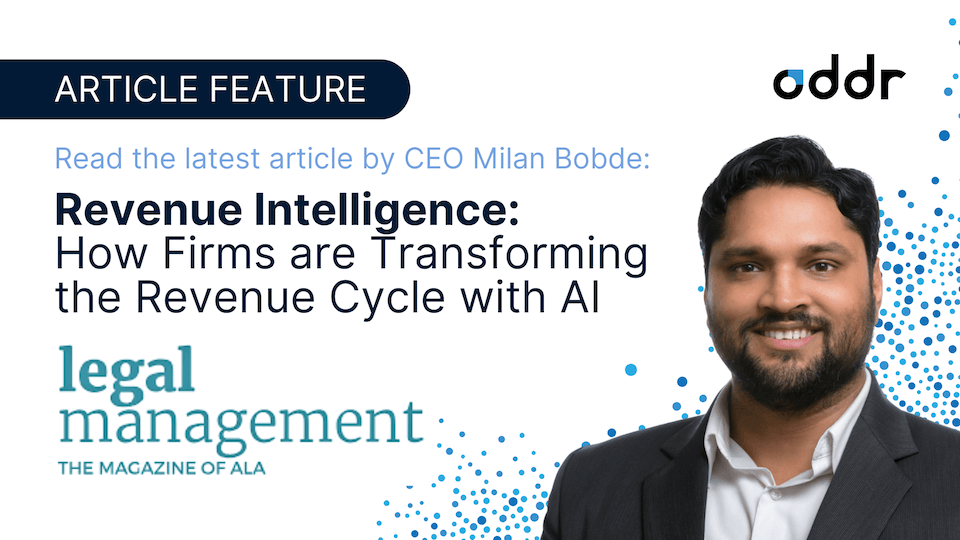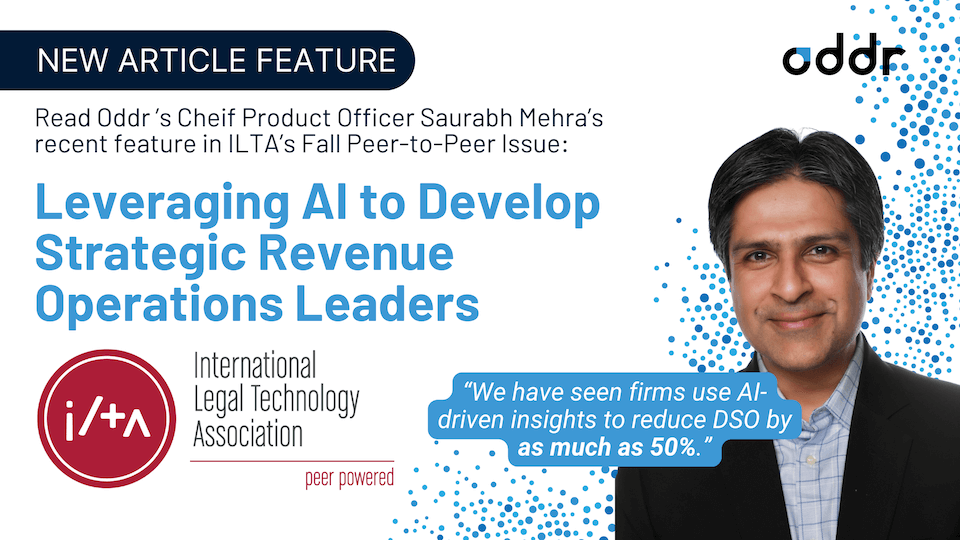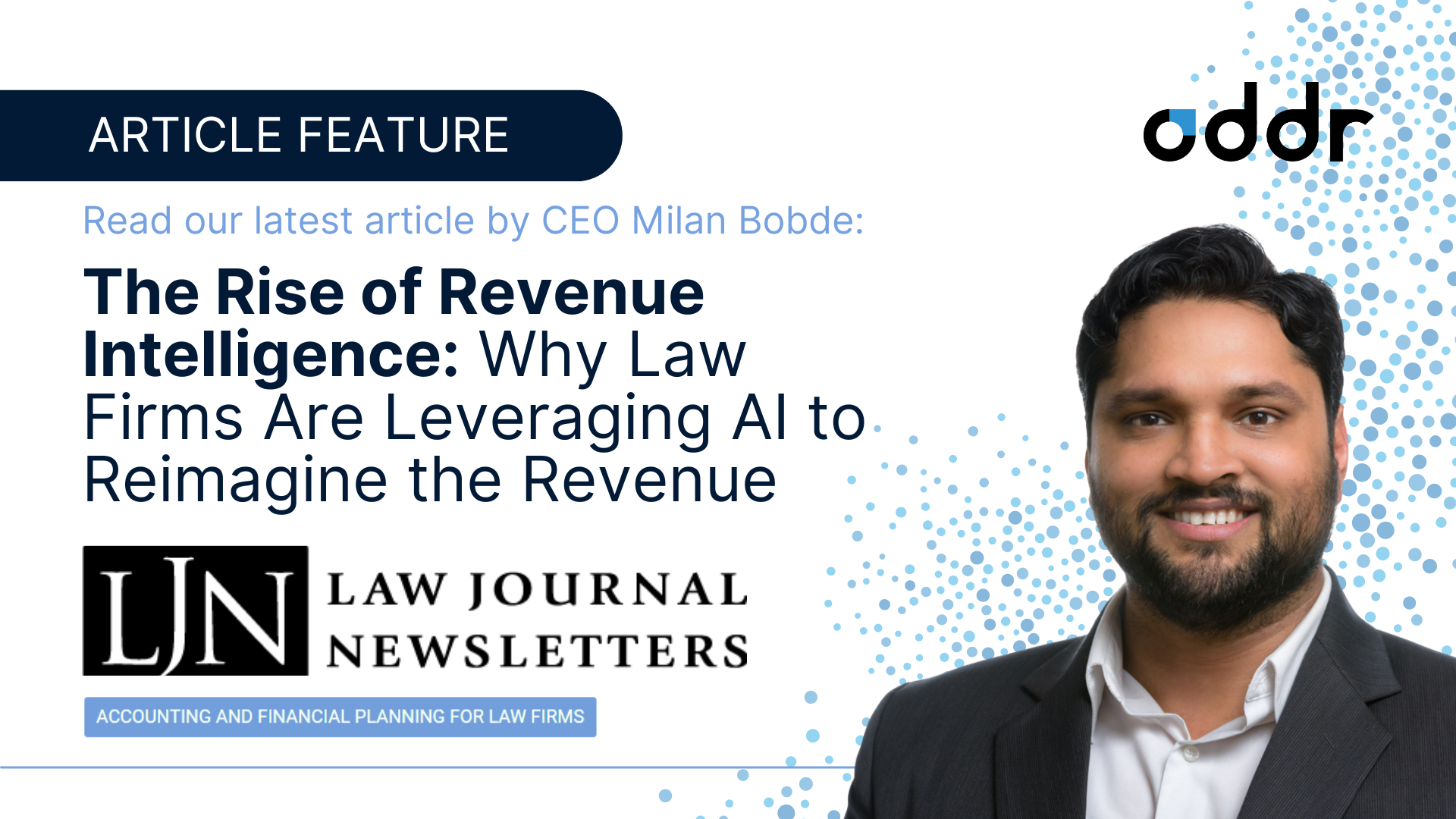Legalweek Conversation with Bob Ambrogi

.avif)

Bob Ambrogi
It's great to meet you and great to have this opportunity to learn a little bit more about Oddr. I wonder if you could start by telling me why you founded this company, what is your background, what is the problem that you see, why did you want to do this?
Milan Bobde
We started Oddr about two years ago. I've been in legal tech for close to 20 years now — starting my journey with Elite. I spent ten years at Intapp launching multiple products, having had the pleasure of working with lots of law firms. Two years ago, when we started with Oddr, we spent the first three to four months just talking to about 80 different firms, trying to understand how professionals and finance teams spend their time in this critical function of invoice to cash.
Milan Bobde
When we talked with professionals across firms, this was an area they were really struggling.
Every firm wants to be better in this area, but they don't have the right tools. If you look at the global legal landscape, there is a write off of $100 billion every year, and this is a very conservative approach. Just looking at just the top thousand law firms in the United States — they send about 120,000,000 invoices a year. When was the last time we did an activity so frequently but had zero insights from it?
Milan Bobde
There's no learning and that was the whole premise. How can we make it easier for firms to have this one single glass pane view to manage their entire invoice lifecycle — from sending the invoice out, tracking it, sending statements, reminders, making integrated payments easy for their clients, and then doing the reconciliation to make this a simple and easy set of processes for the firm?
Bob Ambrogi
When you say that invoice to cash is kind of a term of art, you're talking about the full lifecycle from invoicing, sending out the bill, to getting paid, correct?
Milan Bobde
Yes. When we say invoice to cash now, once an invoice is finalized every month, law firms close their month. Firms will generate pre bills and then they generate the final invoices which are ready for distribution. That's where Oddr comes in. We bring all those invoices into our platform and send the invoices out. Today, if you look at it, by and large it's PDF invoices. The way PDFs are sent today, for the most part, is a biller would go to outlook, type up an email, type up the person, drag and drop the PDF and send it out and then do this several thousand times.
Milan Bobde
We make it easy by eliminating that. In Oddr, you have pre-configured email templates that are ready to go at the press of a single button. Oddr allows them to schedule, and it's finalized, ready to send out.
In Oddr, PDFs aren’t sent via email attachments — it is more sent like a DocuSign link with nothing attached to it. With this, you now bring visibility into the law firms where they haven’t had it before. Oddr tracks the email delivery, email open and click through, and we track the invoice view. Today, law firms have no visibility after they send out the PDF attached invoice. Typically, it'll show up in a 60-day outstanding report that notes these invoices are not paid.
Milan Bobde
In Oddr, firms have insights into whether the client has even looked at the invoice. With this functionality firms can send a quick note to the client reminding them over the overdue invoice. Here's the link again. And by the way, it's due in one week, right? Imagine you just cut 30 days of your outstanding sales. We have found that the longer the invoice is outstanding, the less likely it's going to be paid. Additionally, for an invoice that is outstanding for 90 days or more, law firms begin to offer discounts just to move the invoice along and get paid. This whole lockup is something that law firms are struggling with.
Bob Ambrogi
Yeah, so I mean, it sounds a little bit like bill.com for law or something like that analogy.
Milan Bobde
Oddr is similar to bill.com, but we bring in a lot of other aspects to it too. When a biller is sending out an invoice, they would know when the client will pay. Oddr mines that data. We profile each of their clients to understand the typical turnaround time a firm’s client will open and pay their invoices. With this, firms understand when sending an invoice they should get paid in X number of days — and if they don’t, then Oddr automatically raises a flag that notifies this client is outside their behavior.
Bob Ambrogi
So that gets them beyond the lockup problem.
Milan Bobde
That's exactly right. Oddr gives insights into data such as: this client has been asking increasingly more and more discounts; or this client paid invoice 1st, second and fourth, they missed the third one; or this client views the invoice typically ten times before they pay. Today, these are all the signs that law firms have no visibility into — but desperately need.
Bob Ambrogi
You said you've been in legal tech, I think, 25 years or so. Has anybody else tried to tackle this problem? As you say, so much of the tech that I've seen is focused on preparing the bill, the pre bill, the review of the bill, sending out the bill, and then, like I say, you send out the bill and that's it. That's where the tech stops.
Milan Bobde
That's right.
Bob Ambrogi
Are you alone in this field, or is anybody else doing what you're doing?
Milan Bobde
When it comes to cash to invoice, there are bits and pieces of these problems that have been solved, but we haven't come across someone who looks at it as holistically and as a center of focus like Oddr does. You can argue that Elite does this like they would have collections, but their focus is not this. Their focus is accounting. Their solution is not as advanced and as informative as law firms would really want it to be.
But if you look at payments today, they have made a lot of progress. There are lots of new companies that make payments easy. They give a breadth of choices to law firms. Whether you want to accept credit and debit cards, ACH, wire, or e-checks. No one is really trying this to make it easy for folks to go at any point.
And not just the professionals in the finance team, but even attorneys. When we’re talking to the Directors of Finance, they constantly get inquiries from their partners to say to understand more insights as to where their invoices are. Oddr makes it easy for them to know where their invoices are, who their top ten clients are, who pay on time, and who their top clients are who do not pay on time.
Bob Ambrogi
So you launched two years ago. What's happened since then? Have you been gaining traction?
Milan Bobde
So we started the company about two years ago. First five months, we did our due diligence. We just talked with lots of firms. We also raised money — we really were lucky to get some institutional VCs based out of Silicon Valley along with some law firms to invest with us. On top of that, we also got the legal tech fund.
Milan Bobde
We also got a partner at O’Melveny to be our investor. This definitely was great traction for us. We then started to put together a team. Between the three members of the founding team, we have more than 50 years of experience. Oddr’s other two founders have been in legal tech and building and launching products for decades. We then got some industry veterans who have done this many times ago, and we put together the team. We got busy — building the Oddr platform, and we launched towards the end of ILTACON in August of last year. Currently, we have two firms live using it for six months now. You can find their case studies with us in our latest webinars on our website.
Milan Bobde
They're extremely happy and we have a few implementations in progress right now and a strong pipeline. We have some good traction, we have good references, and our team is busy implementing multiple projects right now.
Bob Ambrogi
So what's on the roadmap now going forward? We're here at Legal week starting a new year. What are your plans?
Milan Bobde
I think from our perspective, we keep looking at this process and keep adding value. One of the things that we recently launched in beta was our cash flow predictions. This is very important to firm CFOs. In professional services, cash flow is the lifeline. We took all this data we have and then we used our algorithms and machine learning in the back end to come up with a very reliable, predictive cash flow algorithm. What we are also now working on now is bringing these insights that no one else is able to do and give firms a warning that a client is at risk — allowing the firm to be proactive rather than reactive.
Milan Bobde.
Finding these nuggets of information and infusing more technology to make billing easier for firms is our goal. I'll give an example — write offs are such a cumbersome process today. If someone wants to write off, let's say 5% or 10%, it's all in emails, back and forth. Lawyers don't like to go to multiple applications, and no one keeps track of emails as an audit trail. Oddr simplified this by completely automating this process for the firm.
Bob Ambrogi
What's the range of size of law firms that are your target customer?
Milan Bobde
We generally look at law firms with 50 lawyers and above today. This is because generally once you get to a certain size, law firms kind of evolve into best of breed mentality. They will have the best time system, the best invoicing system, the best knowledge system, the best risk system, and that's when we kind of come into the play. We are more focused on 50 lawyers — most of our customers are between 55 - 100 attorneys.
Bob Ambrogi
Where does your name come from?
Milan Bobde
That's a very interesting story. So when we are thinking of names, we came up with a lot of boring names.. At the end of the day, what we wanted was a four letter catchy name for us. And one of our investors suggested, how about Oddr? We obviously looked it up and Oddr has a couple of meanings. One is it's a tip of a spear that's kind of reflected in our logo. Also, it's also a famous Icelandic character with lots of different powers, but that's the genesis of it.
Bob Ambrogi
That's interesting.
Milan Bobde
Yeah. One thing we always joke about is we like to be called Oddr and not odor. So we always try and catch that. But ideally, we want to make this a verb. “Hey, don't send your invoice, Oddr your invoices.”
Bob Ambrogi
That's when you know you've made it, when your brand name has become a verb. Right.
Milan Bobde
That's our goal. We want to help all these people, professionals who struggle day-in-day-out, trying to make an impact on a problem that they just don't have the right tools today to solve.
Bob Ambrogi
Well, thank you very much for talking. Pleasure.
Milan Bobde
Yep, same here, Bob, thank you so much.
Bob Ambrogi
Okay. All right.
Milan Bobde
Thank you so much. All right, thanks.



.svg)


